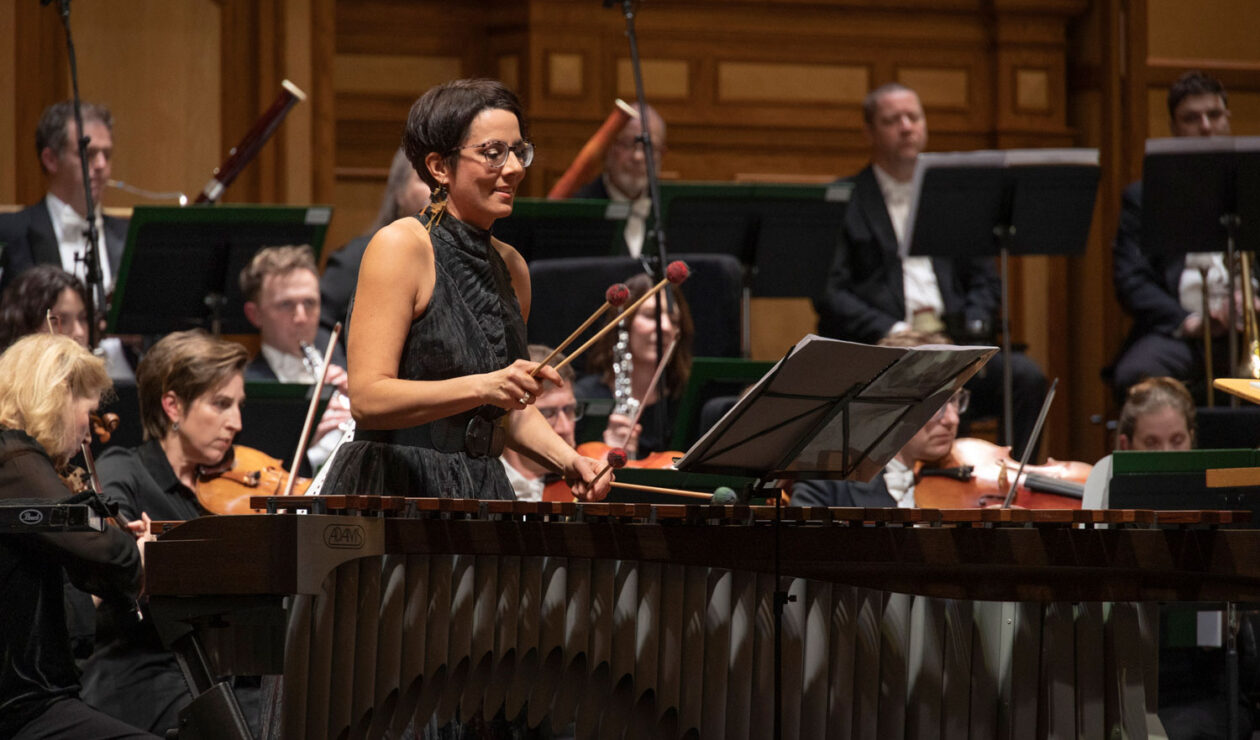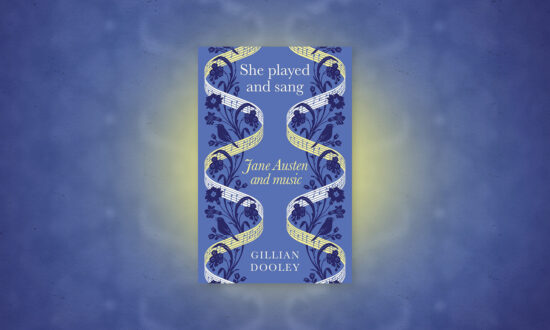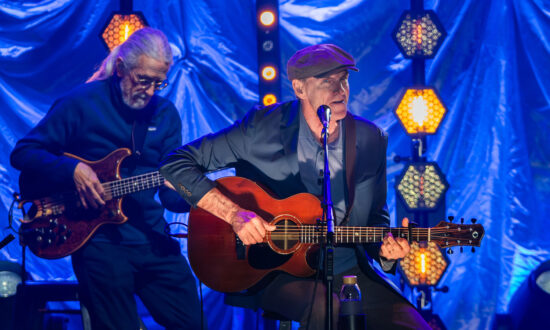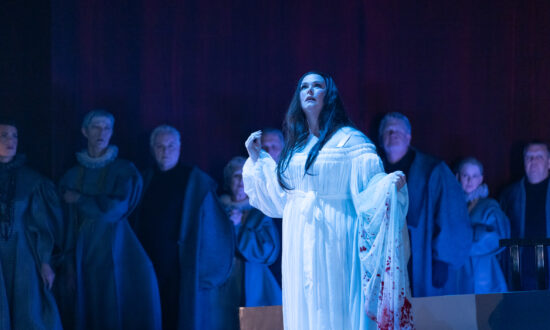One might reasonably imagine that the idea of composing a concerto for marimba is not in itself new, and that a fair few must have sprouted up in the 20th century. But as it happens, Milhaud, Takemitsu and Bennett are about the only recognisable names who have done so before – and it’s fair to say that their concertos for marimba and orchestra count as fairly minor works.
Which means it is virtually greenfield territory for a contemporary composer to think of how to write for this unusual combination. Adelaide’s Anne Cawrse has clearly considered the possibilities very carefully, as her new concerto for marimba and orchestra, Dare to Declare, is a conspicuously successful work.
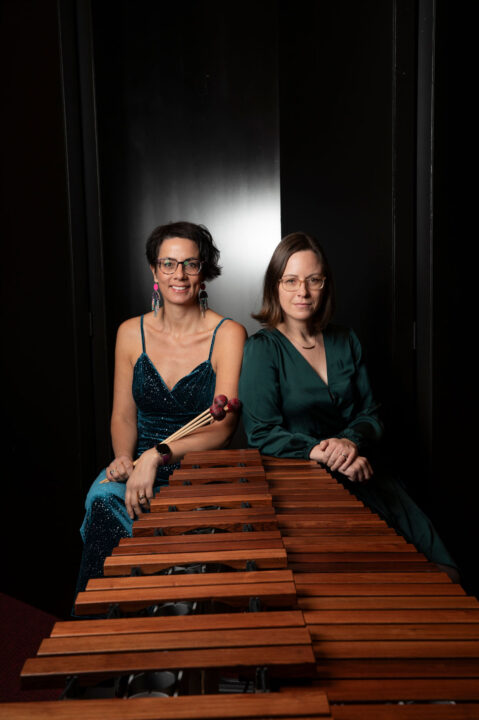
Marimbist Claire Edwardes with composer Anne Cawrse. Photo: Shane Reid / supplied
As she so often does, Cawrse has chosen to follow in the longer footsteps of history rather than break out in any overtly experimental way – and who could blame any composer today for doing that, with such acute nervousness shown by orchestras over what appeals and sells? Accordingly, Dare to Declare follows a standard three-movement concerto format, embraces what we may broadly describe as traditional tonal language, and relies on a four mallet technique on the marimba (ie two sticks in each hand) to produce the instrument’s characteristic alternating stroke and tremolo effects.
Dare to Declare is nevertheless a very skilfully conceived and undeniably beautiful work. In the outer movements, Cawrse creates joyfully animated rhythms and gorgeous harmonies for the marimba that fall easily on the ear and distantly remind one of Ross Edwards. During the soloist’s rest periods, glowing harmonies rise up in the accompanying strings in almost cinematic grandeur, but just briefly, so as to not steal the attention. The middle movement, reflective in mood, consists of gently tapered slivers of sound in which soloist and orchestra move together exquisitely in tandem.
The work gains its subtitle from three Australian arts figures who inspired its movements: poet Oodgeroo Noonuccal, painter Clarice Beckett and composer Peggy Glanville-Hicks. Add another female champion to the list, because marimbist Claire Edwardes, the concerto’s dedicatee, is a luminary in her field too. Darting from one end of the 2.6m-wide instrument to the other, she dazzled with energy and authority.
One had a sneaking feeling while enjoying this wistful work that here might be the definitive marimba concerto, and this its definitive performance. Cawrse and Edwardes have truly given us something special.
Not that everything in this concert was on an equal plane. How such a well-known work as Dvořák’s Ninth Symphony (From the New World) could have fallen short of expectations was curious, given how much more straightforward it should be to play than a brand new work – except that over-familiarity might have been the very problem. After the initial excitement of Kodály’s Dances of Galánta and then the premiere, the magic of this symphony seemed to mysteriously evade the orchestra.
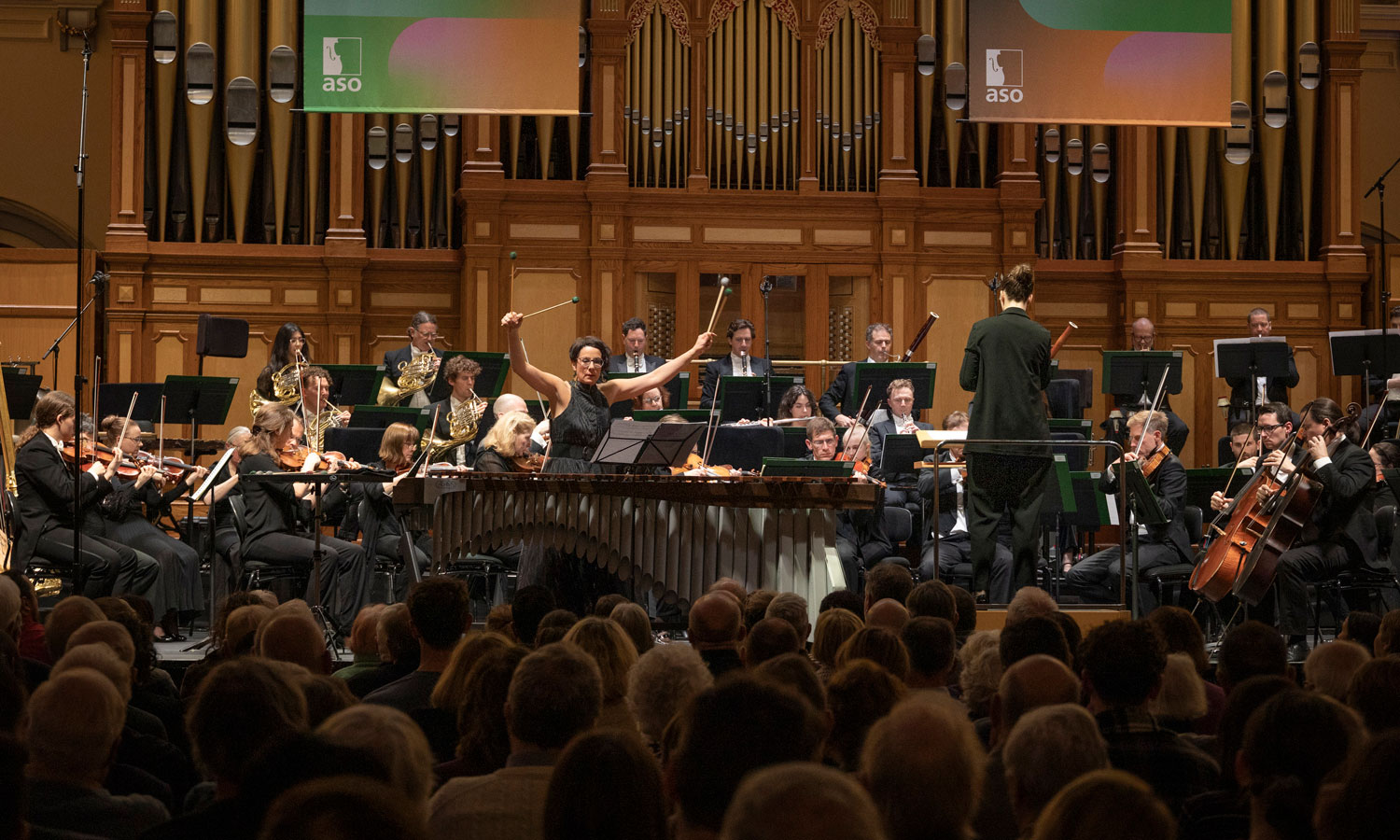
The ASO performs Symphony Series concert Embrace, under the baton of Elena Schwarz. Photo: Shane Reid / supplied
Elena Schwarz’s conducting was impressive in its precision and discreet judgment in the Kodály and Cawrse, but a work so ripely expressive as Dvořák appeared to be less amenable to her instincts. There was a feeling that she was crafting the work phrase by phrase rather than embracing its full emotion. Tenderness was needed – more flexibility with line.
As all who love the New World Symphony know, there are parts that are shiveringly beautiful, especially in the slow movement: in its famous melody one has to feel the tug of home-longing – that sense, as Anna Quindlen has described it, of home being a metaphor for all the experiences we understand as children.
Misadventure did not help. The first movement’s climax turned out to be rather more dissonant than Dvořák intended. But the chief problem was that the symphony’s innocent glory moments just went by unheeded. For the most part it was a technically fine performance, and the ASO can take credit for that; but sometimes fine isn’t enough.

Get InReview in your inbox – free each Saturday. Local arts and culture – covered.
Thanks for signing up to the InReview newsletter.
A superior performance was to be found earlier in Dances of Galánta. In its different way, this work conveys feelings of recollection, too: it is the composer’s homage to folk music he heard as a child in Galánta, a small town formerly in Hungary but now in Slovakia. One can always admire the vividness of Kodály’s writing, whether in this or the comparable Dances of Marosszék: it is warmer than that of his compatriot Bartók but just as rhythmically alive.
Schwarz was excellent here, placing accents in all the right places to give it zesty character; and the ASO’s neat, colourful playing was a pleasure to hear. Most memorable was Dean Newcomb playing in the work’s prominent clarinet solos. What a wonderful musician he is.
Embrace, part of the Adelaide Symphony Orchestra’s Symphony Series, was presented at Adelaide Town Hall on Friday and Saturday nights. The next Symphony Series concert will be Vitality, conducted by Pinchas Zukerman, on July 28 and 29.
Support local arts journalism
Your support will help us continue the important work of InReview in publishing free professional journalism that celebrates, interrogates and amplifies arts and culture in South Australia.
Donate Here
